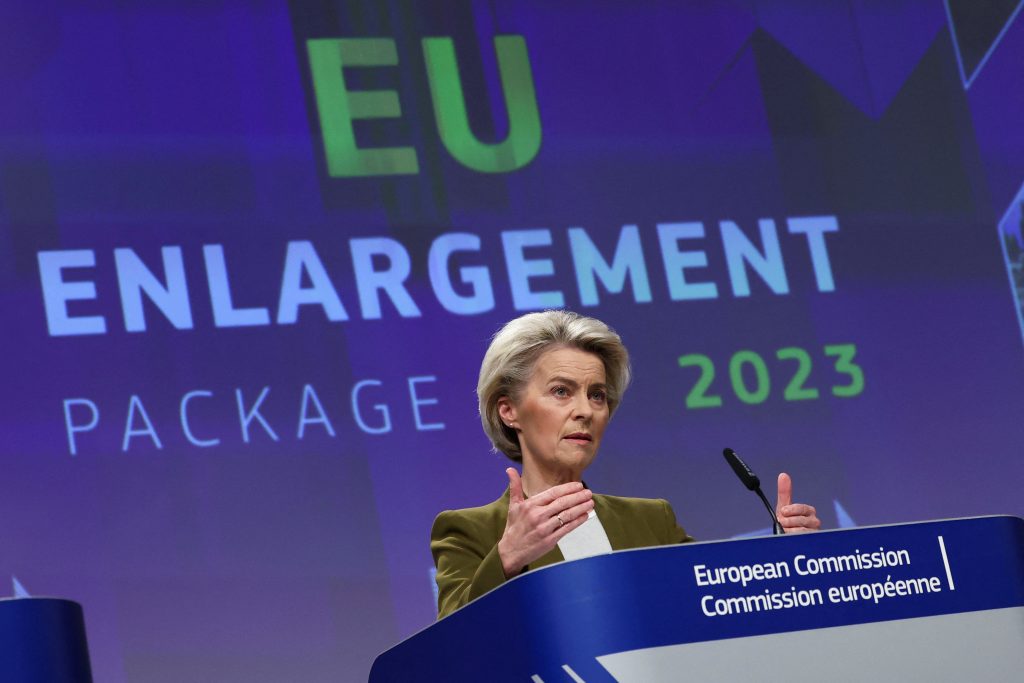It was never about staying twenty-seven forever. On Wednesday, the European Commission recommended to the Council of the EU open discussions with Ukraine to join the European Union, which currently has three members out of thirty. Could Moldova and Georgia, which also had their long-standing EU applications boosted by the Commission, join forces with Ukraine to make up the difference? And what about the many Western Balkan countries that now seem to have stalled in their decades-long membership efforts? Below, Atlantic Council experts answer important questions about the current situation of EU enlargement.
1. What has the European Commission recommended and what effect will it have?
Politically and symbolically, Wednesday’s European Commission recommendations constitute major steps for Ukraine, Moldova and Georgia. But the road to full EU membership for all three countries remains long and arduous. The call to open accession negotiations with Kyiv and Chisinau, as well as the candidacy status for Tbilisi, are conditional on the implementation of additional rule of law and anti-corruption measures. This is in line with Commission President Ursula von der Leyen’s efforts on managing expectations in recent months. Von der Leyen sought to offer Kiev in particular a genuine European perspective while emphasizing that the enlargement process will remain merit-based, both to maintain leverage in the process and to allay the concerns of members of the EU.
—Jörn Fleck is the senior director of the Atlantic Council’s Europe Center.
2. What are the next steps for the EU?
The Commission’s recommendations shared on Wednesday constitute a key step, although quite early in the accession process, towards the European ambitions of these countries. But these recommendations are not enough to launch negotiations. This can only happen once EU member states vote (unanimously) on the Commission’s suggestions at next December’s European Council meeting. The vote is expected to pass as the Council traditionally follows Commission recommendations, but before a unanimous ‘yes’ there will likely be a lively debate on budgetary reform and reform of the common agricultural policy which will to a large extent define the how enlargement will work. .
Once potential new members receive unanimous support to achieve candidate status (Georgia) and then to open accession negotiations (Ukraine, Moldova and Bosnia and Herzegovina), the real work begins. Once the negotiation framework is established, aspiring members work on more than thirty negotiation chapters organized into six thematic groups to prepare countries to implement EU laws and standards (acquired). And again, member states must unanimously agree that all requirements have been met. Only then can the final set of Commission recommendations, Member State votes and approval by the European Parliament take place, preceding the ratification of an Accession Treaty which will finalize the process.
Needless to say, the process is long and technical. And a recurring complicating factor is the need to obtain unanimous approval from member states at numerous intervals. As the European Parliament elections approach in June 2024 and a number of national elections in the same period, the composition of the Parliament and Member States’ priorities regarding enlargement (and, therefore, of EU reform) could change considerably over the same period. Within the allotted time, these aspiring members work on the negotiations.
Despite a consensus in Brussels that enlargement has significant geopolitical momentum, the historic scope of this ten-country enlargement package will require negotiations on EU reform to take place in parallel, and it is not yet clear exactly how these reforms will evolve.
—Lisa Homel is deputy director of the Europe Center.
3. What does this mean for Ukraine?
The European Commission’s recommendation to open accession negotiations with Ukraine is an important step towards the country’s eventual membership. Russia initially attacked Ukraine in 2014, in part because Ukrainians wanted closer ties with Brussels rather than Moscow, which angered Russian President Vladimir Putin’s imperial vision of Ukraine as a ” Little Russia.” Kyiv’s tenacious determination to continue its Euro-Atlantic trajectory in the face of Russia’s full-scale invasion is impressive and was repeatedly highlighted in the Commission’s recommendations report.
Indeed, Ukraine’s post-2014 reforms have helped the country fight Russia more effectively and helped move the country forward on the path to EU membership. Decentralization reform, privatization initiatives, digitalization of public services and improved anti-corruption efforts have made Ukrainian society more resilient and brought the country closer to EU standards.
Yet kyiv still has many ways to improve its case for EU membership. As the Commission noted, Ukraine still needs to implement comprehensive judicial reform to weed out questionable judges and improve oversight. Ukraine’s anti-corruption authorities have made progress in the fight against corruption, but they must be truly independent to fully fulfill their mandate. These two elements will make the Ukrainian economy more competitive and more resilient and improve its attractiveness to foreign investors, all essential elements to alleviate some of the structural deficiencies identified by the Commission in its report.
The recommendation to open accession negotiations with Ukraine is a victory for kyiv and for its partners who want to see the country defeat Russia and formalize its integration into the European Union.
—Andrew D’Anieri is a resident scholar at the Atlantic Council’s Eurasia Center.
The start of accession negotiations – if approved by the 27 EU leaders in December – would be a major step for Ukraine. Russia’s invasion of Ukraine has clearly given the EU enlargement process much-needed geopolitical significance and urgency. The geopolitical situation combined with kyiv’s impressive progress in domestic reforms while waging a war have led to a promising change in Ukraine’s long-term membership prospects.
But the transformations required on both sides – within the EU and for Ukraine – are too complex to allow the process to be accelerated further. Ukrainian policymakers will need to maintain their ambition and public support in the demanding process of alignment with EU standards. It ranges from changes in the judicial and public sector to profound economic, tax and budgetary reforms through more than thirty chapters, organized into six thematic groups. Meanwhile, the EU and its member states will not only have to manage controversial reforms of some pillars of the Union, but also find creative ways to offer Ukraine quick wins and visible progress in order to maintain the dynamics of reforms on the path to full membership.
—Jörn Fleck
4. Where are Moldova and Georgia?
The Commission’s recommendation to open accession negotiations with Moldova is another step in President Maia Sandu’s excellent record of promoting her country’s aspirations for European integration. Chisinau and Kyiv now find themselves at very similar stages on their EU accession paths, having made significant progress since achieving candidate status in July 2022, but with discrete reform priorities remaining to be realized in the months to come. For Moldova, this means taking comprehensive steps to clean up its justice system, continuing to fight against oligarchs who preside over a well-established system of high-level corruption and organized crime, and making further progress in strengthening democracy and of the protection of human rights in the country. The Stakes Are High: Fugitive Oligarch Ilan Shor and Pro-Russian Executives would have met with Kremlin officials in Istanbul immediately after the Commission’s decision, as Moldova’s Moscow-oriented opposition parties prepare to challenge Sandu in next fall’s presidential election.
The European Commission’s recommendation to grant Georgia candidate status comes around eighteen months after Moldova and Ukraine officially became EU candidates. Tbilisi lags behind Chisinau and Kiev on the path to EU membership, largely because it cannot seem to stray from its own path. The ruling Georgian Dream party, led by Bidzina Ivanishvili, has poisoned the country’s politics in recent years by consolidating power, harassing civil society leaders and playing football with Moscow, while Russia continues to occupy 20 percent of the country’s territory and pursues a policy of peace. major war of aggression against Ukraine. These policies have deeply polarized Georgia. Even so, 83 percent of Georgians want to join the EU, as the Commission noted in its report, but they are held hostage by internal political struggles in the capital and the government’s counterproductive policies.
—Andrew D’Anieri
5. What about the Western Balkan countries?
The Commission’s report paints a mixed picture for Western Balkan countries, some of which have been in the EU’s waiting room for two decades. The frustration among some in the region that Ukraine appears to have been fast-tracked by the EU for political reasons is comparable to Commission assessments of modest progress on reforms, at best, even among most avant-garde countries. If Albania and North Macedonia meet other EU demands and their previous commitments, the Commission suggests opening negotiations on the first group of “fundamental principles” related to public sector reforms, justice and fundamental rights. Montenegro, a self-proclaimed candidate country, and Bosnia-Herzegovina, a surprise winner of candidate country status last year, are left empty-handed after what Brussels sees as limited progress.
—Jörn Fleck
Further reading
Fri June 30, 2023
The next member of the European Union is…
New Atlanticist
By
Ten years after Croatia joined the bloc – the last country to do so – Atlantic Council experts are examining eleven countries that could join next.
Image: European Commission President Ursula von der Leyen speaks during a press conference with European Commissioner for Neighborhood and Enlargement Oliver Varhelyi in Brussels, Belgium, November 8, 2023. REUTERS/Yves Herman



